论约翰洛克的财产-英文
- 格式:doc
- 大小:37.50 KB
- 文档页数:4
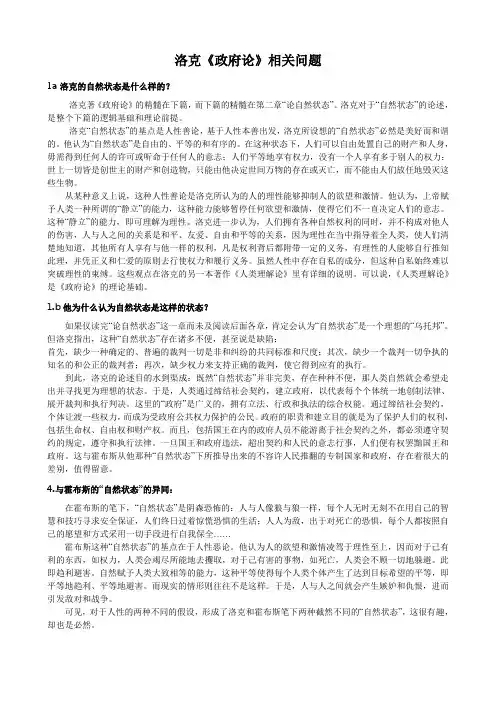
洛克《政府论》相关问题1a洛克的自然状态是什么样的?洛克著《政府论》的精髓在下篇,而下篇的精髓在第二章“论自然状态”。
洛克对于“自然状态”的论述,是整个下篇的逻辑基础和理论前提。
洛克“自然状态”的基点是人性善论,基于人性本善出发,洛克所设想的“自然状态”必然是美好而和谐的。
他认为“自然状态”是自由的、平等的和有序的。
在这种状态下,人们可以自由处置自己的财产和人身,毋需得到任何人的许可或听命于任何人的意志;人们平等地享有权力,没有一个人享有多于别人的权力;世上一切皆是创世主的财产和创造物,只能由他决定世间万物的存在或灭亡,而不能由人们放任地毁灭这些生物。
从某种意义上说,这种人性善论是洛克所认为的人的理性能够抑制人的欲望和激情。
他认为,上帝赋予人类一种所谓的“静立”的能力,这种能力能够暂停任何欲望和激情,使得它们不一直决定人们的意志。
这种“静立”的能力,即可理解为理性。
洛克进一步认为,人们拥有各种自然权利的同时,并不构成对他人的伤害,人与人之间的关系是和平、友爱、自由和平等的关系,因为理性在当中指导着全人类,使人们清楚地知道,其他所有人享有与他一样的权利,凡是权利背后都附带一定的义务,有理性的人能够自行推知此理,并凭正义和仁爱的原则去行使权力和履行义务。
虽然人性中存在自私的成分,但这种自私始终难以突破理性的束缚。
这些观点在洛克的另一本著作《人类理解论》里有详细的说明。
可以说,《人类理解论》是《政府论》的理论基础。
1.b他为什么认为自然状态是这样的状态?如果仅读完“论自然状态”这一章而未及阅读后面各章,肯定会认为“自然状态”是一个理想的“乌托邦”。
但洛克指出,这种“自然状态”存在诸多不便,甚至说是缺陷:首先,缺少一种确定的、普遍的裁判一切是非和纠纷的共同标准和尺度;其次,缺少一个裁判一切争执的知名的和公正的裁判者;再次,缺少权力来支持正确的裁判,使它得到应有的执行。
到此,洛克的论述目的水到渠成:既然“自然状态”并非完美,存在种种不便,那人类自然就会希望走出并寻找更为理想的状态。
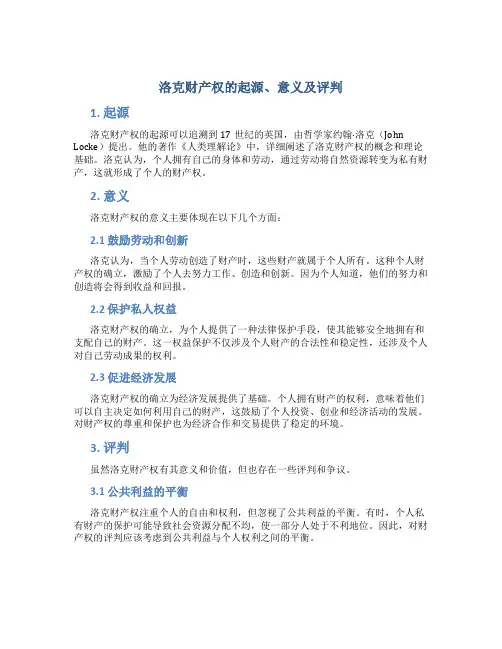
洛克财产权的起源、意义及评判1. 起源洛克财产权的起源可以追溯到17世纪的英国,由哲学家约翰·洛克(John Locke)提出。
他的著作《人类理解论》中,详细阐述了洛克财产权的概念和理论基础。
洛克认为,个人拥有自己的身体和劳动,通过劳动将自然资源转变为私有财产,这就形成了个人的财产权。
2. 意义洛克财产权的意义主要体现在以下几个方面:2.1 鼓励劳动和创新洛克认为,当个人劳动创造了财产时,这些财产就属于个人所有。
这种个人财产权的确立,激励了个人去努力工作、创造和创新。
因为个人知道,他们的努力和创造将会得到收益和回报。
2.2 保护私人权益洛克财产权的确立,为个人提供了一种法律保护手段,使其能够安全地拥有和支配自己的财产。
这一权益保护不仅涉及个人财产的合法性和稳定性,还涉及个人对自己劳动成果的权利。
2.3 促进经济发展洛克财产权的确立为经济发展提供了基础。
个人拥有财产的权利,意味着他们可以自主决定如何利用自己的财产,这鼓励了个人投资、创业和经济活动的发展。
对财产权的尊重和保护也为经济合作和交易提供了稳定的环境。
3. 评判虽然洛克财产权有其意义和价值,但也存在一些评判和争议。
3.1 公共利益的平衡洛克财产权注重个人的自由和权利,但忽视了公共利益的平衡。
有时,个人私有财产的保护可能导致社会资源分配不均,使一部分人处于不利地位。
因此,对财产权的评判应该考虑到公共利益与个人权利之间的平衡。
3.2 土地私有化的问题洛克财产权理论中关于通过劳动转变自然资源为私有财产的观点,被一些人认为是土地私有化的理论基础。
这引起了对土地私有化的批评,因为土地资源是自然共有资源,将其私有化可能导致不公平和资源的浪费。
3.3 社会不平等的加剧洛克财产权的确立虽然鼓励了个人的努力和创新,但也可能导致社会不平等的加剧。
由于财产权的存在,无论是创业成功还是财产继承,都可能导致个人财富的不平等分配,加大了社会阶层的差距。
结论洛克财产权的起源和意义主要在于鼓励劳动、保护权益和促进经济发展。
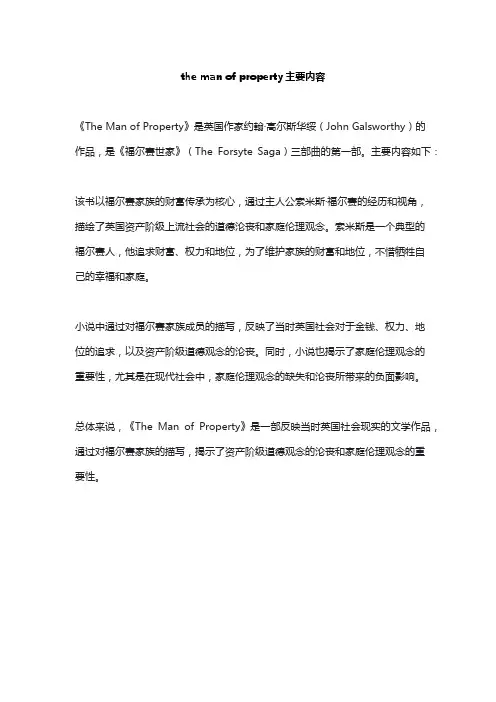
the man of property主要内容
《The Man of Property》是英国作家约翰·高尔斯华绥(John Galsworthy)的
作品,是《福尔赛世家》(The Forsyte Saga)三部曲的第一部。
主要内容如下:
该书以福尔赛家族的财富传承为核心,通过主人公索米斯·福尔赛的经历和视角,描绘了英国资产阶级上流社会的道德沦丧和家庭伦理观念。
索米斯是一个典型的
福尔赛人,他追求财富、权力和地位,为了维护家族的财富和地位,不惜牺牲自
己的幸福和家庭。
小说中通过对福尔赛家族成员的描写,反映了当时英国社会对于金钱、权力、地
位的追求,以及资产阶级道德观念的沦丧。
同时,小说也揭示了家庭伦理观念的
重要性,尤其是在现代社会中,家庭伦理观念的缺失和沦丧所带来的负面影响。
总体来说,《The Man of Property》是一部反映当时英国社会现实的文学作品,通过对福尔赛家族的描写,揭示了资产阶级道德观念的沦丧和家庭伦理观念的重
要性。

洛克的同意名词解释洛克的同意(Lockean Consensus)是指对于英国哲学家约翰·洛克(John Locke)的理论和思想遭到广泛接受的看法。
洛克的同意围绕着他在政治哲学、自然哲学和认知论等领域的观点,他的思想影响了整个近代欧洲和美国的政治、社会和法律制度。
这篇文章将探索洛克的主要观点,并解释为什么他的思想得到了如此广泛的认可。
在政治哲学领域,洛克的主要贡献是他对于政治合法性的论述。
他认为政府的合法性来自于社会契约,即人民自愿将一部分权力交由政府来管理,同时政府有责任保护人民的自然权利。
这一观点可以追溯到他的著作《论政府论文》(Two Treatises of Government)中,这本书被看作是民主政治理论的里程碑之作。
洛克强调了个人权利的重要性,包括生命、自由和财产权。
他认为政府的责任是保护这些权利,如果政府无法履行这一职责,人民有权反抗并推翻它。
这一理念对后来的美国独立战争和法国大革命产生了深远影响。
在自然哲学方面,洛克提出了他的经验主义观点。
他认为人类的思维和知识来自于经验,而不是来自于先天的知识。
他反对理性主义,即认为知识是通过理性推理而非经验获得的观点。
洛克认为人类的心灵是一张白纸,在与外界进行感知和经验的交互作用后,才能产生知识与思维。
因此,对于洛克来说,经验是认识世界的基础,也是思维的源头。
在认知论方面,洛克对知觉和概念的关系做出了重要论述。
他认为所有的知识都可以追溯到感性经验,而我们获得知识的方式是通过将感官印象转化为概念。
这一观点对于后来的认知科学和心理学有着深远影响。
洛克将人类的思维过程比作一种锁与钥匙的关系,他的理论指出了知觉与概念之间密切的联系,并强调了感官经验在知识获取中的关键作用。
洛克的这些观点受到了广泛的认可,有许多原因可以解释这种现象。
首先,他的理论强调个人权利和自由,这与当时的君主制和封建制度形成鲜明对比。
他的思想为后来的民主制度奠定了基础,并对人权的普遍接受产生了积极作用。

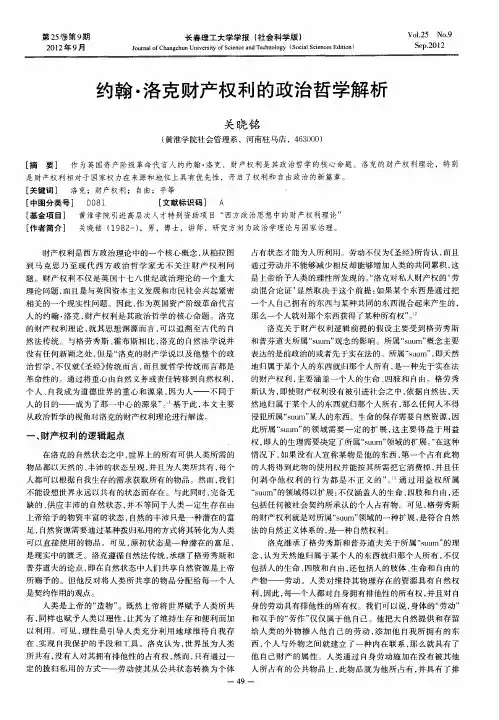
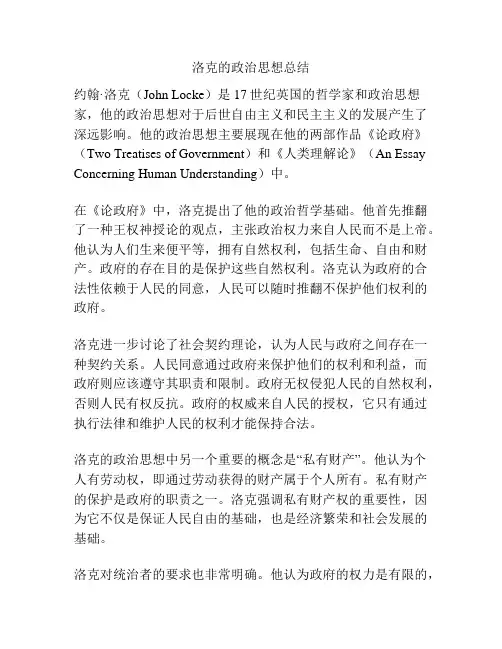
洛克的政治思想总结约翰·洛克(John Locke)是17世纪英国的哲学家和政治思想家,他的政治思想对于后世自由主义和民主主义的发展产生了深远影响。
他的政治思想主要展现在他的两部作品《论政府》(Two Treatises of Government)和《人类理解论》(An Essay Concerning Human Understanding)中。
在《论政府》中,洛克提出了他的政治哲学基础。
他首先推翻了一种王权神授论的观点,主张政治权力来自人民而不是上帝。
他认为人们生来便平等,拥有自然权利,包括生命、自由和财产。
政府的存在目的是保护这些自然权利。
洛克认为政府的合法性依赖于人民的同意,人民可以随时推翻不保护他们权利的政府。
洛克进一步讨论了社会契约理论,认为人民与政府之间存在一种契约关系。
人民同意通过政府来保护他们的权利和利益,而政府则应该遵守其职责和限制。
政府无权侵犯人民的自然权利,否则人民有权反抗。
政府的权威来自人民的授权,它只有通过执行法律和维护人民的权利才能保持合法。
洛克的政治思想中另一个重要的概念是“私有财产”。
他认为个人有劳动权,即通过劳动获得的财产属于个人所有。
私有财产的保护是政府的职责之一。
洛克强调私有财产权的重要性,因为它不仅是保证人民自由的基础,也是经济繁荣和社会发展的基础。
洛克对统治者的要求也非常明确。
他认为政府的权力是有限的,它应该遵守法律和立法机构的制衡。
政府不应该滥用权力,也不应该侵犯人民的权益。
对于违反这些原则的统治者,人民有权利推翻他们并建立新的政府。
洛克的政治思想对于后世的自由主义和民主主义思潮产生了深远的影响。
他的观点强调了个人权利和私有财产的重要性。
他的社会契约理论为人民参与政治决策提供了法律和道德基础。
他的政治观点也影响了美国独立宣言的起草,其中包括了许多洛克的思想。
洛克在政治哲学领域的贡献被视为对现代民主制度的奠基石之一。
然而,洛克的政治思想也存在一些争议。
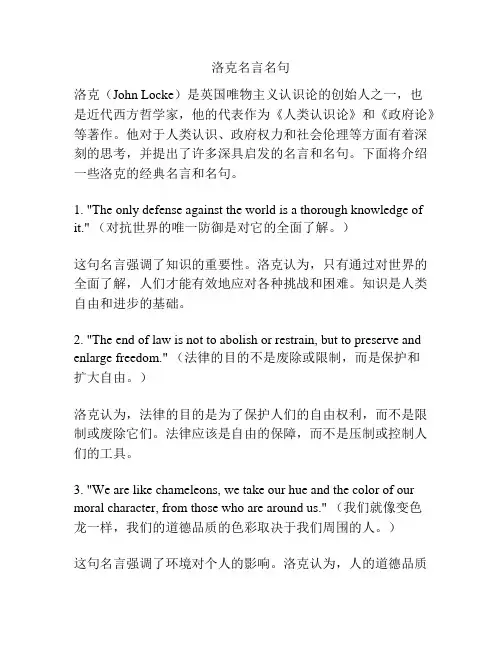
洛克名言名句洛克(John Locke)是英国唯物主义认识论的创始人之一,也是近代西方哲学家,他的代表作为《人类认识论》和《政府论》等著作。
他对于人类认识、政府权力和社会伦理等方面有着深刻的思考,并提出了许多深具启发的名言和名句。
下面将介绍一些洛克的经典名言和名句。
1. "The only defense against the world is a thorough knowledge of it." (对抗世界的唯一防御是对它的全面了解。
)这句名言强调了知识的重要性。
洛克认为,只有通过对世界的全面了解,人们才能有效地应对各种挑战和困难。
知识是人类自由和进步的基础。
2. "The end of law is not to abolish or restrain, but to preserve and enlarge freedom." (法律的目的不是废除或限制,而是保护和扩大自由。
)洛克认为,法律的目的是为了保护人们的自由权利,而不是限制或废除它们。
法律应该是自由的保障,而不是压制或控制人们的工具。
3. "We are like chameleons, we take our hue and the color of our moral character, from those who are around us." (我们就像变色龙一样,我们的道德品质的色彩取决于我们周围的人。
)这句名言强调了环境对个人的影响。
洛克认为,人的道德品质会受到周围人的影响,所以我们应该选择与道德品质高尚的人为伍,以塑造自己更好的品质。
4. "New opinions are always suspected, and usually opposed, without any other reason but because they are not already common." (新观点总是受到怀疑和反对,仅仅因为它们还不被普遍接受。

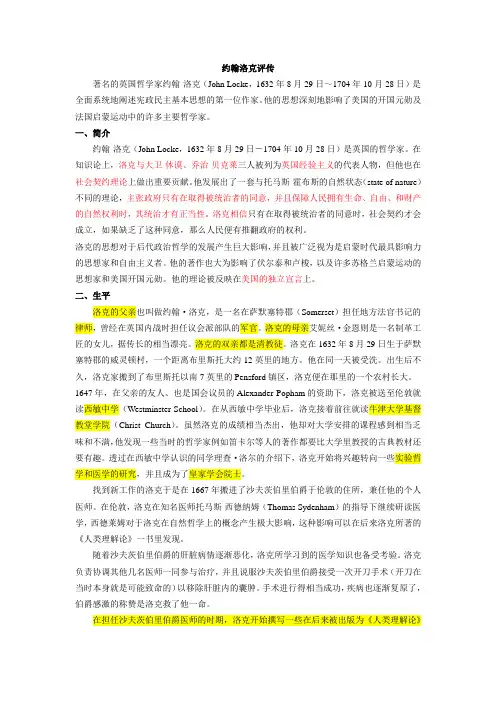
约翰洛克评传著名的英国哲学家约翰·洛克(John Locke,1632年8月29日~1704年10月28日)是全面系统地阐述宪政民主基本思想的第一位作家。
他的思想深刻地影响了美国的开国元勋及法国启蒙运动中的许多主要哲学家。
一、简介约翰·洛克(John Locke,1632年8月29日-1704年10月28日)是英国的哲学家。
在知识论上,洛克与大卫·休谟、乔治·贝克莱三人被列为英国经验主义的代表人物,但他也在社会契约理论上做出重要贡献。
他发展出了一套与托马斯·霍布斯的自然状态(state of nature)不同的理论,主张政府只有在取得被统治者的同意,并且保障人民拥有生命、自由、和财产的自然权利时,其统治才有正当性。
洛克相信只有在取得被统治者的同意时,社会契约才会成立,如果缺乏了这种同意,那么人民便有推翻政府的权利。
洛克的思想对于后代政治哲学的发展产生巨大影响,并且被广泛视为是启蒙时代最具影响力的思想家和自由主义者。
他的著作也大为影响了伏尔泰和卢梭,以及许多苏格兰启蒙运动的思想家和美国开国元勋。
他的理论被反映在美国的独立宣言上。
二、生平洛克的父亲也叫做约翰·洛克,是一名在萨默塞特郡(Somerset)担任地方法官书记的律师,曾经在英国内战时担任议会派部队的军官。
洛克的母亲艾妮丝·金恩则是一名制革工匠的女儿,据传长的相当漂亮。
洛克的双亲都是清教徒。
洛克在1632年8月29日生于萨默塞特郡的威灵顿村,一个距离布里斯托大约12英里的地方。
他在同一天被受洗。
出生后不久,洛克家搬到了布里斯托以南7英里的Pensford镇区,洛克便在那里的一个农村长大。
1647年,在父亲的友人、也是国会议员的Alexander Popham的资助下,洛克被送至伦敦就读西敏中学(Westminster School)。
在从西敏中学毕业后,洛克接着前往就读牛津大学基督教堂学院(Christ Church)。
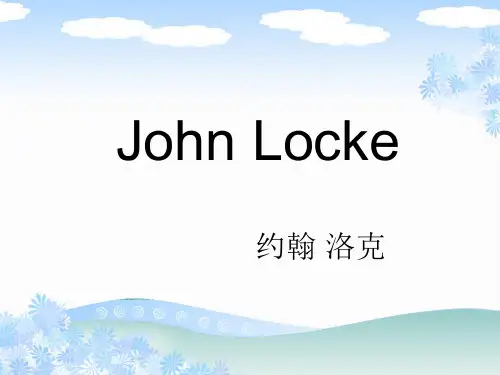
浅析洛克《政府论》中的“论财产”篇摘要“论财产”是《政府论》中重要的章节,洛克认为,人们的私有财产是通过劳动而来,劳动是占有财产的资格与创造价值的来源。
洛克将财产权置于重要地位,他认为人们通过契约组成公民社会的目的是保护私有财产,并且对货币的作用持肯定的态度。
本文是对洛克财产观中的私有财产的合理性、劳动财产权、私有财产的限度和限制问题、财产观中的契约思想以及货币的产生问题进行浅要分析,并提出了其理论中的缺陷。
关键字:洛克政府论,论财产,劳动财产权,货币产生引言 (3)—、私有财产存在的合理性 (3)二、关于劳动财产权 (4)(一)私有财产产生的方式——劳动财产权 (4)(二)劳动财产权开始的时间 (4)(三)通过劳动所产生的财产的地位 (4)三、关于私有财产的限度和限制问题 (5)(一)私有财产是否会触及他人利益 (5)(二)私有财产的限度 (6)(三)对私有财产权的限制——洛克的“腐败说” (6)四、洛克财产观的契约思想——契约对于确定财产权的意义 (7)五、货币的产生 (7)(一)货币产生的原因 (7)(二)货币存在的作用 (7)六、洛克财产观存在的问题 (8)(一)洛克的财产观是维护资产阶级的剥削 (8)(二)对“留给其他共有人的财产”的论述有缺陷 (8)(三)对于劳动完全胜过自然共有状态的问题 (8)结语 (9)参考文献 (10)洛克在《政府论》的下篇第五章对“财产”以自然理性以及神学的观点结合来论述。
短短的篇幅,不乏微言大义,将私有财产及其劳动与财产的关系以及货币的产生予以了论述与解释,具有极大地革命性与创新性。
—、私有财产存在的合理性洛克认为私有财产是从全人类共有财产中划拨而来,而为了充分的利用这些上帝所给予的财产,也即使人们为了维持生存和舒适生活,则必须从上帝为人类所准备的共有的财产中,分离一部分而来使得成为每一个人所私有的财产。
“上帝既将世界给予人类共用,亦给予他们以理性,让他们为了生活和便利的最大好处而加以利用”。
略论洛克的财产权理论[摘要]传统的政治哲学认为:私有财产是社会习俗的产物,不是自然的产物,认为私有财产不是毫无限制的绝对性的权利。
而洛克打破了传统政治哲学的看法,从自然法的角度入手,认为自然上所有的财产是人类共有的,在人类施加了劳动后的产物产生了增值,那么他就取得了该财产的所有权,即洛克所说的“归拨私用”的方式。
洛克看来,财产是合乎自然法的,一个人出于生活的需要占有劳动资料是保持生命的必要手段,所以保护财产就合乎自然法,因此就产生了财产权。
[关键词]私有财产;劳动;财产权一、洛克财产权理论概述洛克认为,人们通过劳动和耕作而获得享用自然资源的权利,是一种排他的个人权利,而这种权利是不依赖于其他人的同意的。
这就是人们通常所说的物质财产权的“最初获得”的问题。
在享受肉食和饮料以及自然所供应的维护他们生存的其他物品时需要一定的手段和方式把共有财产转化为个人的占有和使用。
在这个从公有转化为私有的过程中人们是以“劳动”为中介来获得个人的“财产权”的。
在洛克看来,人类的原初状态实际上是一个普遍的无财产状态。
但个人却对自己的“人身”具有所有权,所以他对自己本身所从事的劳动和活动,也拥有一种自然权利。
因此,只要一个人使得任何一件东西脱离了“自然所提供的和那个东西所处”的状态,他就渗进了自己的劳动,就加入了新的价值,从而排斥了其他人的共同权利。
而这个增益的东西,也就成了“劳动者无可争议的所有物”这就是洛克著名的“劳动学说”。
由此可见,洛克试图用“劳动渗进”理论,来说明物质财产是基于人的生存权,与生俱来的自然权利。
洛克的财产权理论从财产的取得到合法占有是一步一步论述的,他从自然法的角度赋予财产取得自然状态,后又肯定了劳动和工作改变共有状态使财产脱离自然状态的必然和必要,为下一步论述所谓的勤劳的人可以在一定范围内取得无限制的财产奠定了基础。
首先,洛克的财产权理论中认为“土地和一切低等动物为一切人所共有,但是每人对他自己的人身享有一种所有权,除他以外任何人都没有这种权利。
约翰·洛克语录约翰·洛克语录:自由是人类最宝贵的财富自由是人类最宝贵的财富,这句话来自于英国哲学家约翰·洛克(John Locke)。
洛克是17世纪启蒙时期的重要思想家,他的政治哲学对于个人权利和自由的理解产生了深远的影响。
在他的著作《论人类理解》中,他强调个体的自由是人类最基本的权利之一,也是社会进步与繁荣的基石。
洛克认为,每个人天生具有平等的自然权利,其中最重要的就是生命、自由和财产。
他主张政府的存在是为了保护这些权利,而不是侵犯它们。
他认为政府的合法性来自于人民的授权,如果政府无法履行其保护人民权利的职责,人民有权推翻它。
这种思想对于后来的美国独立运动和法国大革命产生了巨大的影响。
自由对于个体的发展和幸福至关重要。
洛克认为,只有在自由的环境中,人们才能充分发挥自己的才能和创造力。
他主张个体应该拥有思想、信仰和言论的自由,这样才能促进知识的进步和社会的繁荣。
他反对专制统治和压制个体权利的行为,认为这种行为会导致社会的衰退和不稳定。
洛克的思想对于当代社会仍然具有重要的启示意义。
在信息时代,个人的自由和权利受到了更多的关注和挑战。
网络的普及和社交媒体的发展给了人们更多的表达自由,但也带来了信息泛滥和隐私侵犯等问题。
洛克的思想提醒我们,自由并不是一种绝对的权利,它需要在法律和道德的框架下得到保护和平衡。
在当今世界,我们仍然需要坚守洛克的理念,保护个体的自由和权利。
政府应该致力于建设一个公平、开放和包容的社会,为每个人提供平等的机会和发展空间。
同时,个体也应该自觉地履行自己的义务,尊重他人的自由和权利。
只有在这种相互尊重和合作的基础上,我们才能实现社会的进步和繁荣。
总之,约翰·洛克的语录“自由是人类最宝贵的财富”提醒我们自由是我们最基本的权利之一,也是社会进步和繁荣的基石。
我们应该珍视和保护自由,同时也要意识到自由的责任和限制。
只有在尊重他人的自由的前提下,我们才能共同创造一个更加自由、公正和和谐的社会。
约翰·洛克(John Locke),于1632年出生于英国的一个清教徒家庭。
洛克的父亲也叫做约翰·洛克,是一名在萨默塞特郡担任地方法官书记的律师,曾经在英国内战时担任议会派部队的军官。
洛克的母亲艾妮丝·金恩则是一名制革工匠的女儿,据传长的相当漂亮。
1646年,在父亲的友人的资助下,洛克被送至伦敦就读威斯敏斯特学校。
在那里,洛克接受了传统的古典文学基础训练。
1652年,洛克就读于牛津大学基督教会学院。
在学习法学和语言学的同时,对医学颇有研究。
1660年封建王朝复辟时,洛克担任牛津大学的讲师。
在牛津期间,洛克对当时盛行的经院哲学并不感兴趣,反而比较喜欢笛卡尔的哲学以及自然科学。
他在36岁时曾被入选英国皇家学会。
也正是由于洛克的哲学观点不受欢迎,他最后决定从师医学研究。
这一时期他还结识了著名的化学家罗伯特波义耳。
1667年洛克成为艾希利勋爵,即后来的沙夫茨伯里伯爵的医学顾问。
在长达十五年的时间里,他多次在伯爵手下担任政府职务,和伯爵的有着密切的关系。
并在此期间开始了其一生中最重要的哲学著作《人类理解论》的创作。
1681年,洛克因受沙夫茨伯里的牵连而遭到迫害。
1684年(?),逃亡荷兰,直到1688年“光荣革命”确立了君主立宪制度,洛克才重获自由。
1689年2月,他和威廉王妃即后来的女王玛利二世一同回到英国,先后担任了高等法院法官、贸易、垦殖部专员等职务。
在抵达英国后不久洛克开始将大量的草稿出版成书,包括了《人类理解论》、《政府论》、以及《论宽容》都在这段时期接连出版。
在1689年和1690年,洛克分别写了两篇《政府论》,1690年的那篇在政治思想史上有重要地位。
从1691年开始洛克一直住在玛莎姆女士的家中,健康状况不断恶化。
1704年10月28日,因病去世,阖然长逝,终生未娶。
对洛克的财产权理论进行分析英国近代启蒙思想家约翰洛克的政治学说对当今西方政治学理论领域和制度设计仍然具有公认的重大影响力。
洛克政治哲学的核心概念是财产权。
洛克甚至将人的生命和自由亦视为人的不可侵犯之财产,并认为政治社会和政府的首要目的就是保护人们的财产。
那么,洛克的财产权理论主要包括哪些内容?这些内容之间具有什么样的逻辑关联?本文试图围绕这两个问题依次展开批判性的分析。
洛克财产权理论的要旨自然理性与财产权的起源。
洛克政治学理论的逻辑起点是自然理性概念,他从人的自然理性出发推导财产权之起源。
在《政府论下篇》第五章论财产的开头,洛克首先指出,人的自然理性赋予人以生存权利,这种权利使每个人对自己的人身具有所有权;其次,自然状态里的人,一开始面对大自然时,对任何外在物品并不具备私人所有权,万物平等地属于全体人类,而非某一个体。
基于此,人如何在大自然中获得维持自身生存所必需的物品,以行使理性的自然法所赋予人的生存权利呢?洛克引入了劳动概念。
他指出,自然状态下的人既然对自己的人身享有所有权,那么他们对基于自己人身的劳动和所得物,也就同样享有合法的所有权,私有财产权由此产生。
这是洛克对财产权之起源的正面论述。
洛克又从反面论证了人为何可以将添加进了自身劳动的自然物视为自己的私有财产这一问题。
如果人对自己的劳动所得物不具备所有权,那么,人自然就没有权利去享用或消费这些所得物。
显然,这一结果与自然法赋予人的生存权利是相悖的。
所以,为了行使和维护人的生存权,自然法必然使人对自己的劳动所得物拥有财产权。
但是,这种财产权是不是一种毫无限制或约束的权利呢?如果问题的答案是否定的,那么人通过劳动所获得的财产之界限是什么?洛克接下来仍从自然理性的理论前提出发,对财产权提出了两条限制。
自然法对财产权的两大限制要件。
自然法使人通过劳动而对劳动对象和劳动产品具有所有权。
同时自然法对这种财产权的成立提出两大限制要件,它们分别是,要件A:个体通过劳动而加工或改造自然物时,必须保证自己留给了其他人足够多的同类自然物; 要件B:个体经劳动所得之产品,必须得到个体的充分和有效利用,对那些因不能充分使用而最终会导致腐败或浪费的那部分产品,个体并不具有财产权。
洛克:权力不能私有,财产不能公有,否则人类就进入灾难之门《政府论》是约翰·洛克于1689-1690年出版的政治著作,汇集了洛克的主要政治哲学思想,不仅使洛克成为古典自由主义思想的集大成者,而且对于后世的现实政治产生了深远的影响。
在《政府论》中洛克主张公民社会是为了对财产权利提供保护才产生的。
洛克所谓的财产是以拉丁文的proprius一词为基础,代表了一个人所拥有的东西—包括了拥有他自己。
也因此,洛克所谓的“财产”包括了拥有“生命、自由、和财产”的权利。
政治社会创立的目标便是为了提供财产权利更好的保护,因为财产能够代表其成员私人的(非政治性的)利益,但却无法代表一些只有与共同体里其他人结合才能实现的利益。
从这个理论延伸,每个人必然都在社会以外(例如在自然状态下)拥有一些财产,因此政府并不是财产权利的唯一来源,也不能够随意挪用个人的财产。
如果政府存在的目标是为了保护财产权利,财产必然是先于政府存在并且完全独立的。
洛克主张一个完整的经济体制的确可以在没有政府的自然状态下存在。
私人财产因此是先于政府而存在的,社会也是为了保护私人财产才形成的。
《政府论》分为上下两篇。
在上篇中,通过对菲尔麦所依据《圣经》的研究,证明了菲尔麦《先祖论》中“君权神授说”和“王位世袭论”的荒诞不经。
洛克极力并有效地驳斥了费尼默的君权神授的主张。
主张政府的权威只能建立在被统治者拥有的基础之上,并且支持社会契约论。
不过他也强调社会契约论是可以废除的。
在下篇中,系统地阐述了公民政府的真正起源、范围和目的。
其主要内容包括:【自然状态】人类最初是处于一种纯粹的自然状态。
自然状态是一种完全的自由、平等的状态。
自然法在自然状态中起支配作用。
理性,也就是自然法,教导着有意遵从理性的全人类:人们既然都是平等和独立的,任何人就不得侵害他人的生命、健康、自由和财产。
【政治社会的起源】人们为什么要从自然状态加入到政治社会,受政治权力的约束呢?这是因为自然状态有三种缺陷:一,在自然状态中,缺少一种制定的、稳定的、人所共知的法律,作为人们共同的是非标准和裁判他们之间一切纠纷的共同尺度(自然状态没有普遍适用的法律体系)。
CORE11-120 Lecture Week EightLocke on Natural Rights the Legitimacy of Government1.Today we take a look at the political philosophy of Hobbes’ most important successor:the English philosopher John Lock (1632-1704). John Locke is widely regarded as the greatest of all English philosophers. He did important work in epistemology (the study of knowledge), metaphysics and philosophy of language as well as political philosophy. He wrote two philosophical masterpieces: An Essay Concerning Human Understanding (1689) and Two Treatises on Government (published anonymously, also in 1689). The lecture today examines some of the main themes from the second (and more significant) of the Two Treatises of Government.2.Locke makes for a fascinating contrast with Hobbes. The Second Treatise is ofteninterpreted as an attempted refutation of Hobbes’s Leviathan, however Locke and Hobbes also share common ground. Like Hobbes, Locke thinks that the legitimacy of government is based on a tacit or implied social contract. Like Hobbes, he also sees the social contract as a rational response to deficiencies within the state of nature. On many important details, however, Hobbes and Locke disagree.3.Let us start with Locke’s characterization of the state of nature. Recall th at Hobbesthought that the state of nature would be a state of war of all against all. Locke’sview of the state of nature is much less dire. The reason for this is that Lockeconsidered humans to be naturally moral beings. We do not always or automatically act well, but we all have the capacity to understand what it is to act well. Humans have a moral conscience, and would have a conscience even in the state of nature.Hobbes, by contrast, thought that our moral character is derived from civil society.He thinks that decency and virtue are achievements of civilization, not features of unadorned human nature. According to Locke, however, we not only have aconscience in the state of nature, we also have rights. Locke famously asserts theexistence of natural rights, and with them, natural law.4.By natural law, Locke means just what Aquinas meant: it is a prescription of the waywe ought to act, which reflects God’s authority over us, and is something that we can discover for ourselves just because we are human and rational. This differs fromwhat Hobbes thought of as “Laws of Nature”: Hobbes’s laws of nature are rational principles of prudence (e.g. seek peace) and rational consistency (honour covenants).Although Locke and Aquinas share a belief in natural law, they nonetheless had a different ideas about what is involved natural law. Recall that Aquinas says thatnatural law enjoins us to seek good and avoid evil (and do so in ways that respect the fundamental goods of life, procreation, society, knowledge, etc.). According toLocke, by contrast, natural law enjoins us to respect others’ natural rights. Lockeargues that we are everywhere and always in possession of these rights – rights that we possess naturally, simply in virtue of our humanity, and not in virtue of ourbelonging to a particular society, or class, or club. This is the idea that wouldeventually develop into the contemporary conception of human rights.5.What are our natural rights, according to Locke? We have three: a right to life,liberty, and property. Our right to life, according to Locke, is a right not to be killed or allowed to die when we could readily be saved. Our right to liberty is the right not to have our activities interfered with so long as we aren’t interferin g with theactivities of others. The right to property is the most interesting natural right. Even without any social arrangements to support private ownership, Locke thinks we can recognize when something is legitimately controlled and used by another (i.e. is truly their property). A right to property is the right to acquire things which are as yetunowned (this is called original acquisition), a right to exchange things with others, a right to give things away, and a right not to have your property stolen or seized orotherwise forced from you. I will have more to say about Locke on property below. 6.So there are natural rights in the state of nature, and people in the state of naturewould be aware of this (provided they are clear-headed enough). Along with natural rights come duties. If I have a right to life, then you have a duty to rescue me if you easily can. If I have a right to liberty, then you have a duty to leave me to do my own thing (providing doing my own thing doesn’t involve infringing on the liberty ofothers). Of course, the mere fact that there are these rights and duties in the state of nature, and people are aware of this fact, doesn’t mean that people in the state ofnature will always respect them. But it does mean that they will respect them often enough to make life in the state of nature a much more peaceable and contented affair than the life envisaged by Hobbes. According to Locke, the state of nature is notgoing to be a war of all against all.7.But what sense can there be to the claim that the state of nature is realm of natural lawand natural right if there is no authority and no civil power to support them? Who will enforce natural rights if there is no civil authority? Locke answers that when a natural right is violated in the state of nature, then the injured party or their familyand friends will act as judge, jury and executioner. This minimal enforcement issufficient to evade the anarchic war of all against all that Hobbes imagined. But it is hardly satisfactory. For a start, as the victim or a friend of the victim, you are hardly in a position accurately determine any violation of natural law and justly respond to it.Secondly, it will often enough be the case that you are not able to adequately enforce natural law: say, for example, that the perpetrator has run off with your goods andyou have not the means to track him down. A more objective, secure, and effective means of law enforcement than any available in the state of nature would be highly valuable, if we could secure it without too much cost. This is the value of civil society.This is why it would make sense to get out of the condition of the state of nature and create a civil society.8.Hobbes’s social contract was a covenant between all people i n a state of nature togive the governance of their own lives up to a sovereign. In return, people getsecurity and access to all the goods of civilization that are dependent upon security.Locke’s vision of the social contract is quite different. In Locke’s view, a propertransition from the state of nature to a civil society would consist in two logicallydistinct steps. First, a social contract is made; this is a free, uncoerced, agreement between people in the state of nature that they be governed by the principle ofmajority rule. In the next step of the process, the majority will create (e.g. vote in) a governing body that will enact laws and enforce them. (This needn’t be a democratic parliament –it could be a monarchy if that’s what the majori ty wanted. Lockerecommends, however, that the branches of government – the legislature and theexecutive – be separated, so there is an effective balance of power in government.) 9.The positive laws passed by this governing body must be consistent with natural lawif it is to remain a legitimate government. Either the laws regulate and protect natural rights – e.g. they encode adequate property rights – or they must be directed toward the benefit of citizens with the approval of the majority. Even in the latter case, the benefit of the majority cannot be won at the expense of the natural rights of theminority. For example, a majority may be in favour of stripping all property from a minority religion (e.g. the Catholic Church in 17th century England). Even it themajority approved of this course of action, or indeed wanted it desperately, such a law would not be just because it violates natural rights. Natural rights function in civil society as a means of avoiding tyranny of the majority and the abuse of minorities. 10.Because the legitimacy of government depends upon the consent of the majority andthe respect of natural rights, it is possible for governments to exist without legitimacy.In these cases, says Locke, rebellion and revolution are just. (Note, this is the exact reverse of Hobbes’s view.) Locke’s views on the legitimacy of revolution werehighly influential. Indeed, much of Locke’s political philosophy exerted a greatinfluence on the founding fathers of the United States.11.A government is legitimate only because everyone has tacitly agreed to abide bymajority rule, thinks Locke. (Notice, this is very different from saying that themajority has agreed to abide by its own rule.) How can Locke say that we have given such consent? We show our consent by continuing to live in the civil society soformed. But forced agreement is not true consent, so it must be that we aren’t forced to live in our society. And Locke thinks that, indeed, we aren’t forced to live in our society; we have the option of migrating, for example. And because the state ofnature is not the disaster Hobbes imagined it to be, we always have the option ofopting out. Any legitimate government must allow its citizens some possibility of opting out. Otherwise it is not operating under genuine consent of its people.12.Recall that one of our three natural rights, according to Locke, is the right to property.Indeed he thinks that one of the chief virtues of the move to civil society is that it is very difficult in a state of nature to adequately protect this right. But how can there be such a thing as property before there exists any of the institutions that supportprivate ownership: e.g. laws of contract, laws of inheritance, a monetary system, and so on? Locke needs a theory about what property is and how it comes about, one that makes the facts of property ownership independent of institutional support.13.How do you ever acquire property? You might be given it. But then, how did thegift-giver acquire the property to give? You might earn it or trade for it. But how did your employer or trading partner own the means to provide wages or the goods to trade with? Perhaps they were given them, earned them, or traded for them. But we can’t go on asking these questions, forever. We need a theory about the first origins of property. How did anyone every acquire property for the very first time? To a first approximation, Locke’s theory is this: something becomes property for the very first time if it is not owned by anybody and you mix your labour with it. To mix your labour with something is work to improve it or make it more useable. For example, if you are wandering through a forest – one that is not owned by anyone – and you pick up a stick, you can’t be said to own the stick. It isn’t your stick, yet. It’s just a stick up picked up. But say you whittle away at it, making it into a carving of a snake. It now becomes your snake-carving. Consider another example. Say you encounter a pear tree – unowned by anyone. If you go to the trouble of picking the pears and placing them in your bag, you now own the pears. You have changed them from relatively inaccessible fruit, to picked fruit, fruit that is ready to eat. So the pears are now yours. (The pear tree isn’t yours because you haven’t done anything to improve it.)14.There are two further conditions on original acquisition. First, you must not acquireso much that it spoils or so much that you can’t make proper use of it. Second, you must leave enough and as good behind you. Say there is only one pear tree in the region and pears are popular. You don’t own the pears if you pick all of them, or even most of them. Nor do you own the pears if you only pick the best and juiciest of them, leaving behind only over-ripe or worm infested pears. You might claimownership, of course, by you do not own the pears by natural right; you do not have a natural right to the pears you have taken in this way, according to Locke.15.Locke’s theory of property is an important el ement of his political philosophy. Itconstitutes is the most important reason to create a civil society. Whereas Hobbes thinks of civil society as, above all else, the protector of our security, Locke thinks of civil society as, above all else, the protector of our property.。